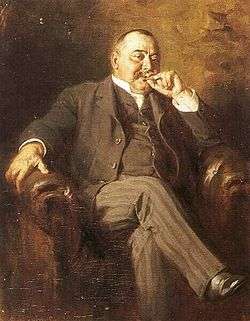Kálmán Mikszáth

Kálmán Mikszáth de Kiscsoltó (16 January 1847 – 28 May 1910) was a major Hungarian novelist, journalist, and politician.
Biography
Mikszáth was born in Szklabonya (Sklabina, Szklabonya, Szlabonya),[note 1][1] Upper Hungary (today's Sklabiná, Slovakia) into a family of the lesser nobility. He studied Law at the University of Budapest from 1866 to 1869, although he did not apply for any exam, and became involved in journalism, writing for many Hungarian newspapers including the Pesti Hírlap.
His early short stories were based on the lives of peasants and artisans, and had little appeal. However, they demonstrated his skill in crafting humorous anecdotes, which would be developed in his later, more popular works. Many of his novels contained social commentary and satire, and towards the end of his life they became increasingly critical of the aristocracy and the burden he believed the latter placed on Hungarian society.
Theodore Roosevelt enjoyed his novel, St. Peter's Umbrella so much that he visited Mikszáth during his European trip in 1910 solely to express his admiration.[2]
Mikszáth was a member of the Liberal Party, and in 1887 was elected to the Diet of Hungary (one of the two top legislatures in Austria-Hungary). Until 1879 he was the representative for the Illyefalva District in Transylvania, and from 1892 until his death he represented the Fogaras District.
He was buried in Kerepesi Cemetery in Budapest, along his sons János (1886–1890) and Albert (1889–1921).
Selected works
- The Slovak Relations (1881)
- The Good People of Palóc (1882)
- The Grass of Lohina (1885)
- Two Beggar-Students (1886)
- The Magic Caftan (1889)
- St. Peter's Umbrella (1895)
- The Siege of Beszterce (1896), adapted to an opera by Ján Cikker
- The Gentry (1897)
- Two Elections in Hungary (1896, 1899)
- New Zrínyiád (1898)
- A Strange Marriage (1900)
- The Women of Szelistye (1901)
- The Young Noszty’s Affair with Mary Tóth (1908)
- The Black Town (1908–1910) (set in the town of Levoča)
Notes
- ↑ In parentheses are official names valid and used in 1808 - 1863
References
- ↑ Majtán, Milan (1998). Názvy obcí Slovenskej republiky: vývin v rokoch 1773-1997. Bratislava: VEDA, vydavateľstvo Slovenskej akadémie vied. p. 600. ISBN 80-224-0530-2.
- ↑ Article in New York Times, April 24, 1910
External links
- Kálmán Mikszáth: The Good People of Palóc
- Works by Kálmán Mikszáth at Project Gutenberg
- Works by or about Kálmán Mikszáth at Internet Archive